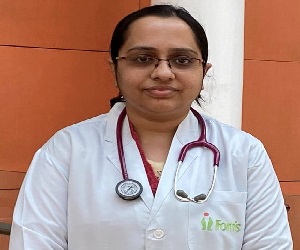About Dr. Sohini Chakraborty

Dr. Sohini Chakraborty is a highly skilled specialist in Haematology and Paediatric Haematology Oncology with over 12 years of experience. She is currently serving as a Consultant at Fortis Memorial Research Institute, Gurugram. Dr. Chakraborty has earned a stellar reputation, with 99% of her patients recommending her services based on 96 ratings. She has received inquiries from 48 patients in the last hour alone.
Qualification
MBBS
MD Paediatrics
FNB Paediatric Haematology Oncology
Work Experience
Consultant, Fortis Memorial Research Institute, Gurugram
Associate Consultant, Narayana Superspeciality Hospital, Howrah, West Bengal
Senior Registrar, Department of Paediatrics, Max Hospital, Saket, New Delhi
Senior Registrar, Department of Paediatrics, AMRI Mukundapur, Kolkata, West Bengal
Specialties
Dr. Sohini Chakraborty excels in the following specializations:
- Hematology
- Paediatric Haemato and Oncology
- Paediatric Haematology Oncology and BMT
Award
Treatment
Bone Marrow Transplant (BMT)
Similar Doctors
View All Top Doctors
Similar Hospitals

View All Top Hospitals
FAQ
A1: A bone marrow transplant (BMT) is a procedure used to replace damaged or diseased bone marrow with healthy stem cells. These stem cells can develop into healthy blood cells, providing a potential cure for various hematologic and oncologic disorders.
A2: Candidates for a bone marrow transplant typically include individuals with conditions such as leukemia, lymphoma, multiple myeloma, aplastic anemia, and certain genetic disorders. The suitability for a transplant is determined based on factors such as the patient’s overall health, age, and the specific diagnosis.
A3: The main types of bone marrow transplants include autologous transplant (using the patient’s own stem cells), allogeneic transplant (using stem cells from a donor), and umbilical cord blood transplant (using stem cells collected from the umbilical cord blood of a newborn). Each type has its indications and considerations.
A4: Potential risks and complications of a bone marrow transplant include graft-versus-host disease, infections, bleeding, organ damage, and complications related to anesthesia. These risks are carefully managed by the medical team during and after the transplant.
A5: The recovery period after a bone marrow transplant varies depending on factors such as the type of transplant, the underlying condition being treated, and the overall health of the patient. Generally, it may take several weeks to months for the immune system to fully recover.
A6: Supportive care measures for patients undergoing a bone marrow transplant may include antibiotics to prevent infections, blood transfusions to manage anemia, medications to prevent graft-versus-host disease, and nutritional support to maintain overall health and well-being.







